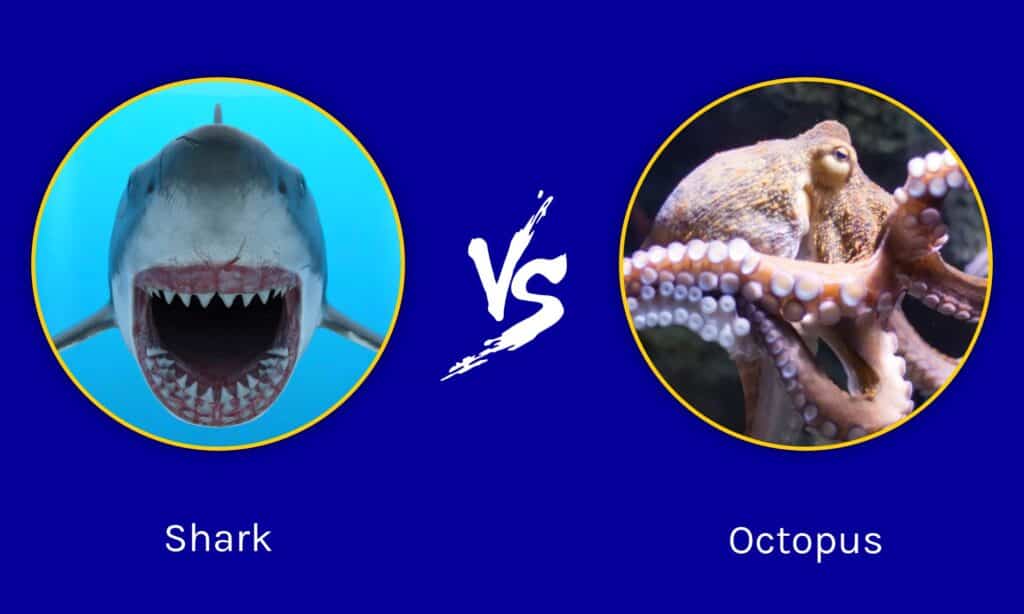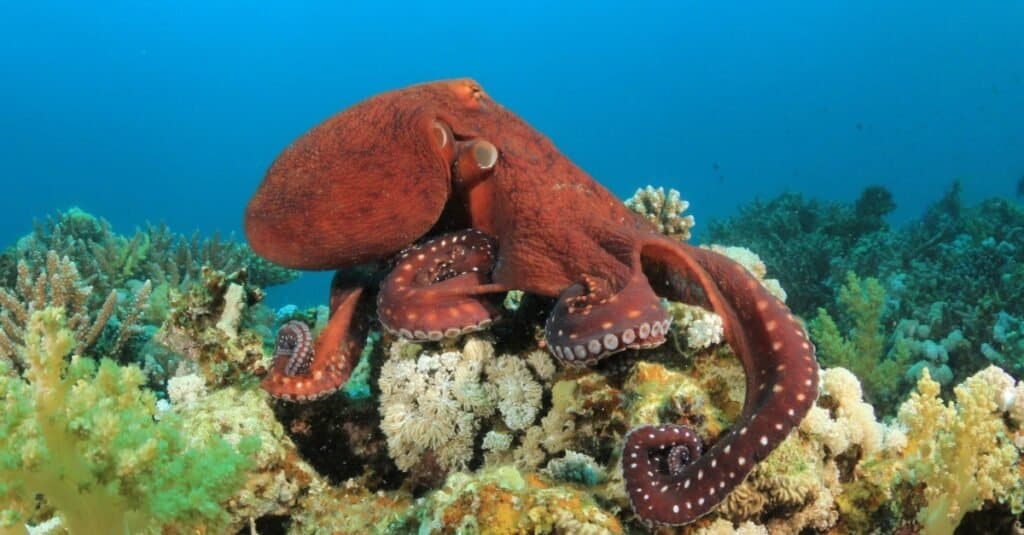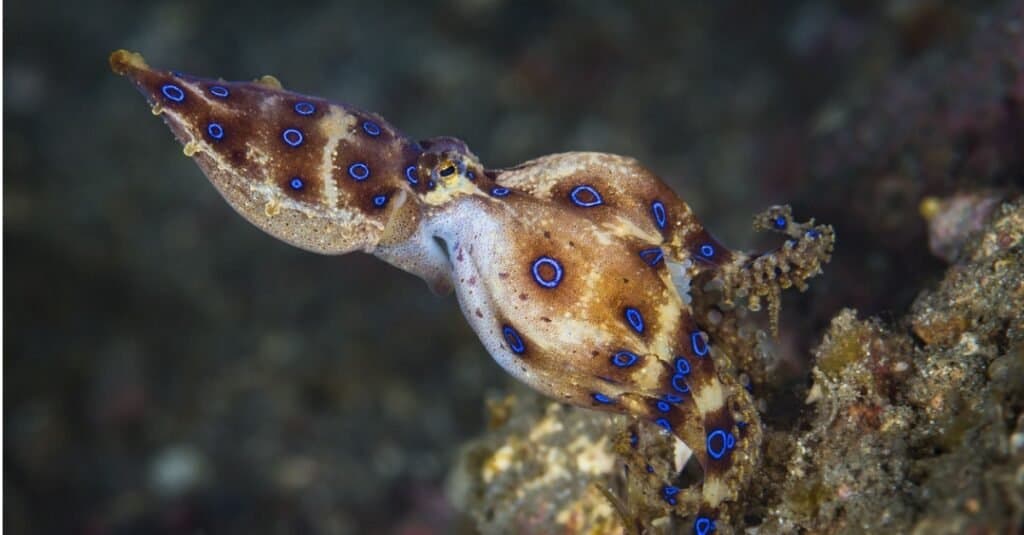The oceans are filled with amazing aquatic creatures. Among them are sharks and octopuses. Sharks are known for being some of the deadliest and most frightening animals that lurk in the ocean. They evolved to be perfect hunters. Meanwhile, octopuses are often credited as being the smartest invertebrate animals alive. In a battle between a shark vs octopus, could brain power outclass that much brawn? We’ll get to the bottom of this situation by showing you how these creatures measure up to one another and what would happen in a fight.
Comparing a Shark and an Octopus

| Shark | Octopus | |
|---|---|---|
| Size | Weight: 1,000lbs – 2,400lbs Length: 11ft – 21ft | Weight: 11lbs-165lbs (rare specimens weigh up to 600lbs) Length: 1ft-15ft |
| Speed and Movement Type | – 20mph – 35mph – Uses an undulating, side-to-side motion from the tail and body. | – 25 mph over short distances – Takes in water and then pushes it out through their siphon to swim – Typically crawls on the bottom of the ocean floor |
| Senses | – Good vision with sharp focus and night vision. – Great whites hear low frequencies, but it’s not their best sense. – Incredible smell for substances at 1 part per 10 billion parts of water – Possess ampullae of Lorenzini to detect electrical fields | – Very good sense of sight, and they can detect how much light is coming at them – Can detect chemicals in the water (smell) on their arms – Low-frequency hearing, but some argue they are effectively dead |
| Defenses | – Large size – Bursts of speed | – Great camouflage thanks to their pigment-bearing cells |
| Offensive Capabilities | – Massive biting power – 4,000 PSI – About 50 teeth are available to bite in the first row, but 300 teeth overall – Teeth 4-6 inches long – Long, triangular teeth – Fast swim speed | – Wrap their foes in their tentacles – Will bite their foes with a sharp, strong beak – All octopuses are venomous, but some are incredibly venomous, like the blue-ringed octopus |
| Predatory Behavior | – Relies on stealth and ambush to attack – Opportunistic predators | – Ambush predator that uses camouflage offensively – Scavenger |
What Are Key Differences Between a Shark and an Octopus?

Octopuses have unique bodies and senses.
©iStock.com/richcarey
The most significant differences between a shark and an octopus are their morphology, size, and senses. Sharks are cartilaginous fish with a torpedo-shaped body that can weigh up to 2,400lbs, while octopuses are cephalopods with eight appendages protruding from their heads that rarely weigh over 150lbs.
Sharks have highly attuned senses of sight and smell, and they function similarly to other fish and even humans. Octopuses gain sensory information from various parts of their bodies in atypical ways. For example, they can sense light and “smell” using their arms.
Sharks and octopuses are very different animals, and that can make comparing them in the realm of combat a little tricky. However, we’re going to take a look at several factors that will help us understand how a battle between these animals would play out.
What Are the Key Factors in a Fight Between a Shark and an Octopus?

Some octopuses have powerful venom, like the blue-ringed octopus.
©iStock.com/RibeirodosSantos
When we talk about a fight between two animals, we can’t just focus on the greatest differences between them. A shark vs octopus battle is no different in that respect. We must look at definitive pieces of information like size, speed, and combat skills to determine which of these animals has what it takes to kill the other.
Shark vs Octopus: Size
Sharks are larger than octopuses both on average and at their extremes. The largest sharks can reach over 20ft in length and weigh 2,400lbs. However, the biggest octopus ever recorded only weighed about 600lbs and grew to 30ft in length.
That was a very rare octopus, but great white sharks have been found at extreme sizes of close to 5,000lbs and 26ft long. They’re not even the largest sharks on record!
In short, most sharks will have a significant size advantage over an octopus.
Shark vs Octopus: Speed and Movement
Sharks are faster than octopuses. The average shark can move at anywhere between 15mph and 25mph, but the mako shark can move between 30mph and 45mph.
Octopuses usually creep along the bottom of the water, moving less than 5mph. Yet, they can swim with burst speeds of 25mph by taking in and spraying out water.
Sharks have the speed advantage over octopuses.
Shark vs Octopus: Senses
Sharks have better senses than octopuses. As we said, sharks are just about the perfect hunters in the wild. They can see well, have a sense of smell that is simply astounding, and they can detect the electrical fields in their prey with their ampullae of Lorenzini.
Octopuses have unique senses. They can sense light throughout their bodies without having great vision. They can “smell” through their arms. Their hearing is limited to low frequencies, and some researchers believe their hearing is simply negligible. Octopuses have unique senses, and more research is needed to understand how they perceive the world.
Sharks have a sensory advantage.
Shark vs Octopus: Physical Defenses
Octopuses can change the color and the texture of their skin, so they can camouflage themselves and blend in anywhere. Also, their colors make some creatures hesitant to attack them because they might be venomous or poisonous.
Sharks are protected by their massive size and their ability to swim quickly over long distances and short distances. Their skin offers them some protection too.
Octopuses have better defenses than sharks.
Shark vs Octopus: Combat Skills
Octopuses vary in their approach to fighting depending on their species. Some of them use venom to overwhelm their opponents. Others will latch onto their prey with their tentacles and viciously bite them with their sharp beaks while also potentially introducing venom into the wounds. While it’s believed that all octopuses are venomous to some extent, not all their venom is impactful against other creatures.
Sharks have one major form of attack: biting. They use their incredible biting power to tear away large chunks of flesh, exsanguinating their foes by driving teeth up to 6 inches long into them and viciously shearing it away.
Sharks have the advantage in terms of combat skills.
Who Would Win in a Fight Between a Shark and an Octopus?

Sharks would win against octopuses in the majority of cases.
©Havoc/Shutterstock.com
A shark would win a fight against an octopus. Although we can find cases where an octopus kills a smaller shark, the size disparity is simply too much for an octopus to overcome. Even if the octopus uses camouflage, it can’t hide from a shark completely. Remember, they don’t need to see their prey to hunt them since they can smell very well and detect electrical fields coming from aquatic animals.
If the two were put in a clear tank of water, the shark would probably just sink its teeth into the octopus and call it a day, even if it was the largest one ever seen. A few bites from the shark would cause such incredible losses in terms of flesh and blood that the creature would die quickly.
An octopus could try to latch onto a shark and bite, potentially delivering venom into the shark’s system. However, unless that venom worked very quickly, the shark is going to come out ahead.
The photo featured at the top of this post is © Martin Prochazkacz/Shutterstock.com
Thank you for reading! Have some feedback for us? Contact the AZ Animals editorial team.






